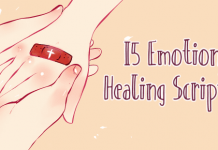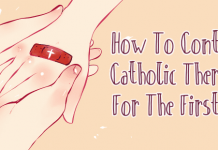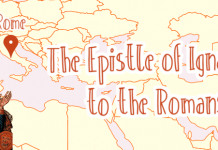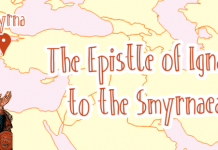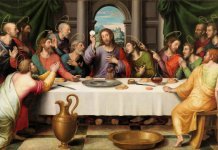Introduction
This Letter from Hell recounts the tragic story of the eternal damnation of a young woman named Ani.
Both the narrative and the letter transcribed below were found among the papers of a deceased nun, who in the world was known as Claire and worked with the condemned woman. This letter was revealed to Claire in a dream shortly after Ani was killed in a car accident.
The narrative received an Imprimatur from the diocese of Treves, Germany in 1953, authorizing its publication as highly instructive. While an Imprimatur is not an affirmation of authenticity, it does guarantee that the text is free from doctrinal error.
The letter first appeared in a book of revelations and prophecies.
Fr. Bernhardin Krempel, Doctor of Theology, published it separately and lent it more authority with his footnotes (included at the end) showing the letter’s absolute concordance with Catholic Doctrine.
The Letter from Hell
I had a friend. That is, we shared a mutual closeness as friends and neighbors while the two of us worked in the same office.
Later, when Ani got married, I never saw her again.
From the moment we met, what reigned between us, in its depth, was amiability more than friendship. Because of this, when she went to live in the elegant neighborhood of villas far from my home after her marriage, I didn’t really miss her very much.
In mid-September of 1937, while I was vacationing at Lake Garda, my mother wrote to me: “Imagine, Ani…dead. She lost her life in an automobile accident. She was buried yesterday in the cemetery of Woodstock.”
The news shocked me. I knew that Ani had never really been religious. Was she prepared when God called her suddenly?
The next morning I attended Holy Mass, which was said for her, in the chapel of the nun’s boarding house where I stayed. I prayed fervently for her eternal repose and also offered my Holy Communion for that intention.
I felt increasingly ill at ease throughout the whole of the day, and that night I slept restlessly.
I awoke suddenly, hearing something like the door of my room being shaken.
As I turned the light on, the clock on my nightstand showed ten minutes after midnight.
I could see nothing. The house was silent. The waves of Lake Garda could be heard breaking monotonously on the wall of the boarding house garden. I did not hear the wind at all.
Nonetheless, upon awaking, I had the impression of having heard another noise besides the shaking of the door.
It was a sound similar to one I used to hear when, in bad humor, my former office manager would toss a problem letter on my desk.
I considered for a moment whether to get up or not. Ah! It was nothing but a figment of my imagination brought on by the news of her death, I assured myself.
Rolling over, I prayed a few Our Fathers for the souls in Purgatory, and again I fell asleep.

I then dreamed that I rose in the morning at six o’clock in order to go to the chapel. But on opening the door to my bedroom, I stepped on a parcel containing the pages of a letter. Picking it up and recognizing Ani’s handwriting, I screamed.
Trembling as I held the pages in my hands, I was, I must confess, so shaken that I could not even utter an Our Father. I was almost suffocating.
There was nothing better to do but to flee that spot and go into the open air. I hastily arranged my hair, put the letter in my purse, and rushed from the house.
Outside, I followed a winding path up through the hills, passing olive and laurel trees and the neighboring farms, and going beyond the renowned “Gardesana” highway. The morning broke radiantly.
On other days, I would stop every hundred paces, enchanted by the magnificent view of the lake and Garda Island. The most suave blue of the water refreshed me and, like a child admiringly gazing at her grandfather, I would gaze upon the ashen-colored Mount Baldo rising 7200 feet above the opposite shore of the lake.
That day, however, I did not have eyes for any of that.
After walking a quarter of an hour, I mechanically let myself sink to the bank and leaned against two cypress trees where the day before I had taken such pleasure in reading “The Damsel Teresa.”
For the first time I regarded the cypress trees as symbols of death, something I had not taken notice of in the south, where these trees are common.
I took up the letter. It lacked a signature, but it was, beyond a doubt, in Ani’s handwriting. There was no mistaking the large volute S nor the French T that used to irritate our manager at the office.
The style was not hers, at least not her usual style of speaking. She conversed and laughed so amiably, with her blue eyes and her graceful nose.
Only when we discussed religious topics did she become sarcastic and fall into a rude tone like that in the letter, whose agitated cadence I now entered.
Here, word for word, is the “Letter from Beyond” of Ani, as I read it in the dream…
 Claire!
Claire!
Do not pray for me. I am damned. As I tell you this and relate to you certain circumstances and details about my condemnation, do not think that I do so out of friendship. Here we no longer love anyone. I do it as “a part of that power that always desires evil but always produces good.”
In truth, I would like to see you here where I will remain forever.1
Do not be surprised at my intent. Here we all think the same way. Our will is petrified in evil—in what you call “evil.” Even when we do something “good,” as I do now in opening your eyes about Hell, we don’t do it with good intentions.2
Remember that we knew each other for four years. You were 23 and had already worked in the office for six months when I arrived. You kept me out of trouble many times, and frequently gave me good advice while I worked as your trainee. But, what is that which is referred to as “good”?
At the time I praised your “charity.” Ridiculous! Your help arose from pure vainglory, as I had already suspected.
Here we don’t acknowledge good in anyone!
You knew me in my youth, but I will now fill you in on certain details.
According to my parents’ plan, I should never have existed. In their carelessness, I was conceived in disgrace. When I came into the light, my two sisters were already 14 and 15 years of age.
I wish I’d never been born! I wish I could annihilate myself at this moment and escape these torments! There could be no pleasure comparable to being able to end my existence, like a piece of clothing reduced to ashes.3
But I must exist; I must be as I have made myself, with the entire blame of my end upon my shoulders.
When my parents, still unmarried, moved from the countryside to the city, they drifted away from the Church, and they kept company with people who had fallen away from religion. Having met each other at a dance, they were “obliged” to get married six months later.
During the wedding ceremony a few drops of holy water fell upon them, just sufficient to draw my mother to Sunday Mass a few times a year. She never taught me to pray correctly. She wore herself out in daily concerns, even when our situations were not that difficult.
It is only with deep repugnance and unspeakable disgust that I write words such as pray, Mass, holy water, and church. I profoundly detest those who go to church, as well as everyone and everything in general.
For us, everything is a torment. Everything we come to understand at death, every recollection of life and of what we know, becomes a burning flame.4
And all of these memories serve to show us the horrible aspect of the graces we rejected. How this torments us!
We do not eat, we do not sleep, nor do we walk with our legs. Being spiritually enchained, we reprobates gaze in terror at our misspent lives, howling and gnashing our teeth, tormented and filled with hatred.
Are you listening? Here we drink hatred as if it were water. We all hate one another.5
More than anything else, we hate God. I will try to make you understand how this is.
The blessed in Heaven must necessarily love God, for they constantly behold Him in His awe-inspiring beauty. That makes them ineffably happy. We know this, and the knowledge infuriates us.6
On earth, men know God through Creation and Revelation and are able to love Him, but they are not forced to do so.
And the believer—I say this seethingly—who contemplates and meditates upon Christ stretched upon the Cross will love Him.
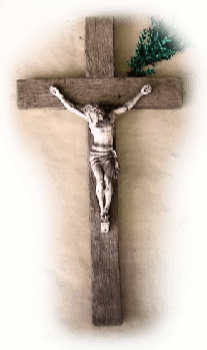 But the soul whom God approaches and surrounds, fulminating as one rejected, as Avenger and Judge, that soul hates God as we hate Him.7
But the soul whom God approaches and surrounds, fulminating as one rejected, as Avenger and Judge, that soul hates God as we hate Him.7
This soul hates Him with all the strength of its perverse will. It hates Him eternally, in virtue of the deliberate resolution to reject God in which it ended its earthly life.
This perverse act of the will can never be rescinded, nor would we ever want it to be.
Do you now understand why Hell must be eternal? It’s because our obstinacy never diminishes and never ends.
But being compelled to do so, I add that God is still merciful towards you.
I say “compelled” because even though as I write this letter, I cannot lie as I would like to do. I put on the paper much that goes against my will. I also have to choke down the torrents of insults I would like to spew forth.
God showed mercy towards us in that He did not allow us to do all the evil that we wanted to do while on earth.
Had he permitted us to do so, we would have greatly added to our guilt and chastisement. He allowed us to die prematurely, as is my case, or permitted attenuating circumstances.
Even now He is merciful towards us, for He does not oblige us to draw near to Him. He allows us to remain in this distant place of Hell, thus diminishing our torment.8 Every step closer to God would torment me more than every step you might take toward a fire.
You were astonished one day when I told you in passing what my father had told me some days prior to my First Communion: “Take care, little Ani, that you get a beautiful dress; the rest is nothing but a sham.”
I was almost ashamed for having shocked you so, but now I laugh about it. The best part of this sham was that Communion was only allowed at twelve years of age. By then, I had already amply sampled the world’s pleasures and had easily left everything religious aside, so I didn’t take Communion seriously.
The new custom of allowing children to receive Holy Communion at seven years of age infuriates us. We strive in every possible way to frustrate this, making people believe that in order to receive Communion there must be comprehension, and that it is necessary for children to have committed mortal sins before first receiving the Eucharist.
The “white God” [that is, the Sacred Host] will then be less prejudicial than if He were received with faith, hope, and love, the fruits of Baptism—I spit on this!—which are still alive in a child’s heart.
Do you recall that I already had this same point of view on earth?
Anyway, I return now to my father. He fought a lot with my mother.
I rarely told you this because I was ashamed of it. Huh! What is shame? Something ridiculous! We are indifferent to everything.
My parents no longer slept in the same room. I slept in my mother’s room and my father slept in the adjoining room, to which he would retire at any hour of the night.
He drank heavily and exhausted all our wealth. My sisters were employed and needed the money they made, so Mother began to work.
In the last year of her bitter life, Father often would beat her when she did not want to give him any money. He was always very kind to me…
I told you about this one day and you were scandalized—but what was there about me that didn’t scandalize you?—such as when I twice returned new pairs of shoes one day because the style of heel wasn’t modern enough for me.
On the night in which a mortal stroke took my father, something happened that I never told you, because I feared a disagreeable interpretation on your part. Today, however, you ought to know it. The fact is memorable, for it is the first time that my true spirit, like that of a cruel executioner, revealed itself.
 I was asleep in my mother’s bedroom. She was sleeping deeply, as her regular breathing indicated. Suddenly, I heard someone utter my name. An unfamiliar voice murmured, “What would happen if your father were to die?”
I was asleep in my mother’s bedroom. She was sleeping deeply, as her regular breathing indicated. Suddenly, I heard someone utter my name. An unfamiliar voice murmured, “What would happen if your father were to die?”
I no longer loved my father, since he had begun to mistreat my mother. Properly speaking, I no longer loved anyone; I only clung to certain people who were still kind to me. Love without a natural motive scarcely exists except in souls that live in the state of grace, which I did not have.
I responded to that mysterious questioner, “Surely he’s not dying.” After a brief interval, I heard the same well-understood question, without troubling myself as to where it came from.
“Whatever! He’s not dying,” was the sullen reply that escaped me. For the third time I was questioned with this voice: “What would happen were your father to die?”
In a flash it passed through my mind how Father often came home somewhat drunk, scolding and fighting with Mother, and how often he embarrassed us in front of our neighbors and acquaintances!
I then cried out stubbornly: “All right, then, it’s what he deserves. Let him die!”
Afterwards, everything became still.
The following morning, when Mother went upstairs to tidy up Father’s room, she found the door locked. Around noon they forced it open. Father was lying half-dressed on his bed—dead, a corpse. He probably caught a cold while looking for a beer in the cellar. He had been sick a long time.
Could it be that God had depended upon the will of a child, to whom this man had shown some goodness, to grant him more time and an opportunity to convert?
You and Marta made me enroll in the association of young ladies. I never told you that I found the instructions of the two directors to be quite conniving. I found the games amusing enough. As you know, I quickly came to hold a preponderant role in them, which flattered me.
I always found the outings pleasant, sometimes even allowing myself to be taken to Confession and receive Holy Communion. I really had nothing to confess, for I never took account of my thoughts and sentiments. I was still not ready for worse things.
One day, I remember, you admonished me: “Ani, you will be lost if you don’t pray more.” In truth I prayed very little, and always reluctantly and with annoyance.
You were undoubtedly right. All those who burn in Hell either did not pray, or didn’t pray enough. Prayer is the first step towards God.
It is always decisive, especially prayer to her who is the Mother of God, whose name we are not even permitted to say. Devotion to her draws innumerable souls away from the devil, souls whose sins would otherwise have cast them into his hands.
I continue, furious at being obliged to do so…
Praying is the easiest thing on earth, and justly so, for God linked salvation to this simplest of actions.
To those who pray assiduously, God grants, bit by bit, so much light and strength that even a drowning sinner is able to raise himself up definitively through prayer, even though he may be immersed in mud up to his entire chest.
In fact, in my last years of life I no longer prayed, and thus deprived myself of the graces without which no one can be saved.
Here we no longer receive any grace at all. Even if we did receive a grace, we would reject it with disdain. All the vacillations of earthly life end in the beyond.
In earthly life, man can pass from a state of sin to a state of grace. From grace he can fall into sin. I often fell out of weakness, rarely out of malice. With death, however, this inconsistent “yes” and “no,” this rising and falling, comes to an end. Through death, every individual enters into a final state, fixed and unalterable.
As one advances in age, these rises and falls become smaller. True, until one dies one can either convert or turn one’s back upon God. In death, however, one decides mechanically, with the last tremors of his will, in the same way he did throughout his entire life.
A good or bad habit becomes second nature, and this is what moves a person one way or another in his final moments. So it was with me.
For years I had lived apart from God. Consequently, when I received that final call of grace, I decided against Him. It was fatal not because I had sinned so many times, but rather because I had so often refused to repent and amend my life.
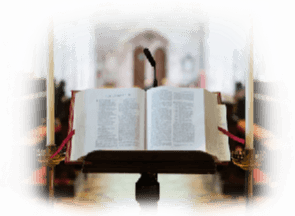 You repeatedly admonished me to hear sermons and to read pious books, but I regularly excused myself, citing a lack of time. Could I have done anything more to increase my inner uncertainty?
You repeatedly admonished me to hear sermons and to read pious books, but I regularly excused myself, citing a lack of time. Could I have done anything more to increase my inner uncertainty?
By the time I reached this critical point, shortly before I left the association of young ladies, it would have been difficult for me to follow any other path.
I felt unhappy and insecure. I had erected a huge wall impeding my conversion, which you must not have perceived. You must have thought my conversion easy when you once said to me: “Ani, make a good confession and everything will be okay.”
I suspected that what you said was true, but the world, the flesh, and the devil already had me securely in their clutches. I never believed in the action of the devil, but now I attest that the devil powerfully influences people such as I back then.9
Only many prayers on the parts of others and my own prayers, together with sacrifices and sufferings, would have managed to wrench me away from him. And this only slowly.
There are very few people who are physically possessed, but many who are possessed interiorly. The devil cannot suppress the free will of those who give themselves over to his influence, yet, as a chastisement for the person’s almost total apostasy, God permits the person to be dominated by “evil.”
Although I hate the devil, I like him because he and his helpers, the angels that fell with him at the beginning of time, strive to cause the loss of the people on earth. There are myriad demons. Uncountable numbers of them who wander through the world, like a swarm of flies, without their presence even being suspected.
It does not fall to us who have been condemned to tempt you; that is left to the fallen spirits.10 Our torments increase every time they bring another soul to Hell, but hatred is capable of anything!11
Even though I trod tortuous byways, God sought me out. I prepared the way for grace by means of works of natural charity that I often did by the inclination of my character. At times, too, God beckoned me to church. When, despite work at the office during the day, I took care of my sick mother, no small sacrifice for me, I strongly felt these attractions to God.
Once, in the hospital chapel where you used to take me during our free time at mid-day, I was so moved that I found myself but one step away from conversion. And I cried.
The pleasures of the world, however, flowed over this grace like a torrent. The thorns choked out the wheat. Rationalizing that religion is sentimentalism, according to the manner it was discussed in the office, I cast this grace, like so many others, to the ground.
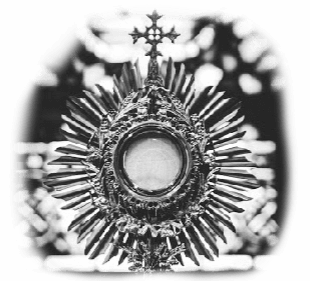 Once you reprimanded me because in church, rather than genuflecting, I made only a hasty nod of my head. You thought it was laziness, not suspecting that I’d already no longer believed in the presence of Christ in the Blessed Sacrament. I now believe it, though only naturally, in the manner that one believes in a storm, the signs and effects of which one perceives.
Once you reprimanded me because in church, rather than genuflecting, I made only a hasty nod of my head. You thought it was laziness, not suspecting that I’d already no longer believed in the presence of Christ in the Blessed Sacrament. I now believe it, though only naturally, in the manner that one believes in a storm, the signs and effects of which one perceives.
In the interim, I had arranged a religion for myself. The general opinion in the office, that after death souls would return to this world in other beings and would pass through yet other beings in an endless succession—that pleased me.
With this, I banished the distressing problem of the hereafter to the point that it is no longer troubling to me at all.
Why did you not remind me of the parable of the rich man and poor Lazarus, in which the narrator, Christ, immediately after their deaths, sent one to Hell and the other to Paradise?
But, what would this reminder have accomplished anyway? Nothing more than your pious advice.
Bit by bit I found a god, one privileged enough to be called a god, but yet distant enough that I didn’t have to deal with him. I was even confused enough to make of myself, at will and without changing my religion, a pantheistic god or even a proud deity.
This “god” had neither a heaven to console me nor a hell to frighten me. I left him in peace. This is what my adoration of him consisted of. One easily believes in what one loves.
With the passing of years, I became sufficiently convinced of my religion. I lived well with it, without it causing me any inconvenience.
Only one thing would have been able to bring me to my senses: a profound and prolonged suffering. But this suffering never came. Do you now understand that “Whom God loves, God chastises”?
The association of young ladies organized an outing one July day. I quite liked those outings, but not the sweetly pious women who went to them. Recently, an image far different from that one of Our Lady of Graces had been placed upon the altar of my heart.
Besides that of Our Lady there stood the gentle, manly figure of Max, who worked in the warehouse. A short time prior to this we had conversed several times. On this occasion, he asked me out on the very Sunday of the ladies’ outing. Another woman whom he had been dating was in the hospital.
He noticed, of course, that I had my eyes on him, but I never thought about marrying him. He was well-to-do but too friendly toward anyone and every young lady. Up to that time I had wanted a man who belonged to me alone, and I alone to him. Thus, I had always kept a certain distance.
[This is true. There was something noble about Ani, notwithstanding all of her religious indifference. It astonishes me that “honest” people are also capable of falling into Hell if they are dishonest enough to flee from encountering God.]
Max heaped every kindness upon me on the day of that outing. Our conversation, of course, was certainly not that of your pious women.
On the following day in the office, you reprimanded me for not having gone with you. I then told you of my Sunday amusements.
 Your first question was: “Did you go to Mass?” Crazy! How could I have gone to Mass when we had agreed to leave at six in the morning? Do you still remember that I added excitedly, “The good God is not so mean as your little priests!” Now it falls to me to confess to you that, His infinite goodness notwithstanding, God takes everything much more serious than any priest.
Your first question was: “Did you go to Mass?” Crazy! How could I have gone to Mass when we had agreed to leave at six in the morning? Do you still remember that I added excitedly, “The good God is not so mean as your little priests!” Now it falls to me to confess to you that, His infinite goodness notwithstanding, God takes everything much more serious than any priest.
After this first outing with Max, I attended just one more meeting of the young ladies’ association. Certain things did attract me at Christmastime, but I had already dissociated myself from you interiorly.
Movies, dances, and outings followed. At times Max and I argued, but I knew how to keep him interested in me.
My rival, upon being released from the hospital, was furious, and I found her very disagreeable. Her anger worked in my favor, though, for my discreet calm made a great impression upon Max and, ultimately, led him to choose me over her.
I knew just how to denigrate her. I would speak calmly, seeming to be objective, but spewing venom from within. Sentiments and insinuations such as these rapidly lead one to Hell. They are diabolical, in the true sense of the word.
Why am I telling you this? To show you how I came to separate myself entirely from God.
To be so distant from God, it was not necessarily to be entirely familiar with Max. I knew that if I lowered myself to that before the time, he would look down on me, so I restrained myself and refused. In truth, I was ready to do anything I thought useful. Determined to win Max, I would stop at nothing.
Little by little we fell in love, for both of us possessed great qualities that we could mutually appreciate. I was talented and made of myself an able conversationalist, and so I eventually had Max in my hands, assured that I alone possessed him, at least in those last months before our wedding.
This is what constituted my apostasy from God: I made a mere creature into my god.
In no other way is this more fully realized than in the relationship between two creatures of the opposite sex; love is stifled in matter. This becomes the allure, the sting, and the venom of the object that is loved. The “adoration” that I rendered towards Max became an ardent religion.
 At this stage of my life I would hypocritically run off to church during the office lunch hour, to the good-for-nothing priests, the mumbling of the Rosary, and other foolishness.
At this stage of my life I would hypocritically run off to church during the office lunch hour, to the good-for-nothing priests, the mumbling of the Rosary, and other foolishness.
You strove to encourage this, with some intelligence but apparently without suspecting that, in a final analysis, I no longer had anything to do with these things. I sought only to set my conscience at ease—I still needed that—in order to justify my apostasy.
In the depth of my soul I lived in revolt against God. You did not perceive that. You always thought I was still Catholic. I wanted to be seen as such, even going so far as giving a donation to the church, thinking that a little bit of “insurance” couldn’t hurt.
As certain as you were about your answers, they always went in one ear and out the other. I was sure that you could not be right. Taking into consideration our strained relationship, when my marriage put some distance between us, the pain of our separation was only slight.
I went to Confession and Holy Communion one more time before my wedding, but it was a mere formality. My husband felt the same way. But why not? We fulfilled those formalities just like any others.
You would call that “unworthy.” But after that unworthy Communion I had greater peace in mind. It was the last of my life.
Our married life was generally harmonious. We had the same opinion on just about everything. That included our shared opinion regarding children: We didn’t want the burden. Deep down, my husband wanted one, naturally, but no more. Ultimately, I was able to banish the idea. I preferred fine clothing and furniture, tea with the ladies, rides in our car, and like amusements.
There passed a year of earthly pleasure from our wedding day until my sudden death.
Every Sunday we went for a drive or visited my husband’s relatives—I was ashamed of mine. My husband’s relatives, like us, swam well on the surface of life.
Inside, however, I never truly felt happy. Something always gnawed at my soul. I hoped that death, certainly far in the future, would end everything.
When still a child, I once heard in a sermon that God rewards the good one does. If He cannot do it in the next life, He will do it on earth.
Thus, without my expecting it, I received an inheritance from my Aunt, and my husband had the good fortune of seeing his salary raised considerably. With this, we were able to decorate our new home well.
My religion was in its last agony, like daylight’s last glimmer in the distant sky. The clubs and cafés of the city and the restaurants where we ate when traveling did not draw us any closer to God. Everyone who frequented them lived as we did, concerned about externals, not essences or things of the soul.
While on vacation we visited a famous cathedral, seeking only to savor the artistic value of the masterpieces it contained.
I counteracted the religious air it radiated, chiefly that of the Middle Ages, seizing every opportunity for ridicule. Thus, I criticized a lay brother who served as our guide for being a bit unkempt and awkward; I criticized the trade of the pious monks who made and sold liqueur; I disparaged the eternal pealing of the bells calling people to churches that care only for money.
I was thereby able to reject every grace that came knocking at my door.
In particular, I let my ill humor flow profusely over every old depiction of Hell in books, cemeteries, and elsewhere, showing devils roasting souls in red or yellow fire while their long-tailed associates continually brought more victims.
Claire, while Hell might be poorly drawn, it can never be exaggerated.
Above all, I always scoffed at the fire of Hell. Do you recall our conversation on the fire of Hell when I jokingly put a lit match under your nose and asked, “Does it smell like this?”
You quickly blew out the match, but here the fire is never extinguished. Moreover, the fire of which the Bible speaks is not the torment of conscience. Fire means fire. One must understand Our Lord’s declaration in its literal sense: “Depart from Me, ye accursed, into everlasting fire.” Literally!
 One might ask how it is that the spirit can be affected by material fire.
One might ask how it is that the spirit can be affected by material fire.
How then, on earth, does the soul suffer when one’s finger is held in a fire? The soul itself does not burn, but what pain the man as a whole endures!
In like manner, here we are imprisoned by the fire in our beings and faculties. Our souls are deprived of their natural movements; we can neither think nor want what we want.12
Do not try to comprehend the mystery that, contrary to the laws of material nature, the fire of Hell burns without consuming.
Our greatest torment consists in knowing with certainty that we will never see God.
Oh, how that toward which we were indifferent while on earth tortures us here!—When the knife but lies on the table, it gives only one a cold feeling. One can see its keen edge, but not feel it. But the moment it enters one’s flesh, he screams with pain.
Before, we only saw the loss of God; now we feel it.13
All souls do not suffer equally. The more frivolous, malicious, and determined someone was in sin, the more the loss of God weighs upon him, and the more torture he feels due to the creation he has abused.
Catholics who are damned suffer more than those of other beliefs because, in general, they received more lights and graces without taking advantage of them.
He who knows more suffers more than those who had lesser knowledge.
He who sinned out of malice suffers more than those who fell from weakness.
No one, however, suffers more than he deserves. Would that this were not true, so that I might have some reason to hate!
You once told me that no one falls into Hell without knowing that this is his destination, as was revealed to a saint. Though I laughed at that, I yet entrenched myself behind the thought that there was still time for me to convert—that is how I thought in my heart.
What you said is true. Certainly, before my sudden end, I did not know Hell as it truly is. No human being does. But of this I had no doubt: were I to die, I would enter into eternity in a state of revolt against God, and I will suffer the consequences.
As I already declared, I didn’t turn back but persevered along the same path, impelled by habit, whereby people act with great deliberation and regularity as they grow older.
My death occurred in the following way…

A week ago—I speak to you in terms of the way in which you measure time; judging by the pain I have endured, I should have already been burning in Hell for ten years—on a Sunday, my husband and I went for a drive, my last one.
The day broke radiantly. I felt well, as I rarely did, but a sinister feeling came over me.
On our way home my husband and I were unexpectedly blinded by the lights of a car rapidly approaching from the opposite direction. My husband lost control of our car.
“Jesus!” I shouted, not as a prayer, but as a scream. I felt a crushing pain—a trifle in comparison with my present pain. I then lost consciousness.
Strange! On that very morning, the idea that I could, after all, go to Mass again came to me unexpectedly. It sounded to me like a supplication. Clear and determined, my “No!” nipped the thought in the bud. I must finish with this once and for all, and I assumed all the consequences.
And now I endure them.
You know what happened after my death. The fate of my husband, my mother, of my body and burial, all of this you know down to the last details, as do I through a natural inclination we have here. We have only a confused knowledge of what transpires in the world, but we know what closely concerned us.
At the moment of my death I awoke from darkness. I found myself suddenly enveloped by a blinding light. It was at the same place where my body lay. It seemed almost like a theater, where the lights suddenly go out, the curtain noisily opens, and a tragically illuminated scene appears: the scene of my life.
I saw my soul as if in a mirror. I saw the graces I had trampled underfoot from the time I was young until that final “No!” to God. I felt like an assassin brought to trial with my inanimate victim before me.
Repent? Never!14 Was I ashamed of myself? Not at all!
Notwithstanding, it was impossible for me to remain in the presence of the God I had denied and rejected. Only one thing remained for me: the fire.
Thus, as Cain fled from the body of Abel, so did my soul flee far away from this overwhelming sight.
That was my private judgment.
The invisible Judge spoke: “Depart from Me!” and my soul swiftly fell, like a sulfurous shadow, into the place of eternal torment!15
Closing Information from Claire
Thus ended the letter from Ani about Hell. The last words were so twisted as almost to be illegible. When I finished reading the last word, the entire letter turned to ashes.
 What is that I hear?
What is that I hear?
Amidst the harsh tones of the lines I imagined reading, there resounded the sweet sound of a bell. I awoke suddenly to find myself still in my bedroom. The morning light of daybreak found its way in. From the parish church came the sound of the bells ringing the Angelus.
Had it all been but a dream?
I had never felt such consolation in the Angelic Salutation as I did after this dream. Pausing, I prayed three Ave Marias. It then became clear, most clear to me: One must always cling to Our Lord’s blessed Mother, venerate Mary as her own child, if one does not want to suffer the same fate told you—albeit in a dream—by a soul that will never see God.
Still frightened and shaking due to that night-time revelation, I got up, dressed myself hastily, and rushed to the chapel of the house.
My heart beat violently. The guests kneeling closest to me looked at me with concern. Perhaps they thought that I was so excited and flushed because I had run down the stairway.
That afternoon in the garden I encountered a kindly, nearsighted lady from Budapest, frail as a child, suffering greatly, yet of lofty spirit and fervent in the service of God. She said to me, “Miss, Our Lord does not want to be served in haste.”
But then she perceived that something else had upset and preoccupied me. She added kindly: “Let nothing distress you—you know the advice of Saint Teresa—let nothing alarm you. Everything passes. He who possesses God lacks nothing. God alone suffices.”
While she humbly whispered these words to me she seemed to be reading my soul.
“God alone suffices.” Yes, He has to be enough for me, in this life and in the next. I want to possess Him there one day, as numerous as may be the sacrifices I have to make here in order to triumph. I do not want to fall into Hell.
“Let nothing disturb thee; Let nothing dismay thee; All thing pass; God never changes. Patience attains all that it strives for. He who has God finds he lacks nothing: God alone suffices.” — St. Teresa of Ávila
Footnotes:
1. St. Thomas Aquinas, Summa Theologica, Question 98, Article 4 — “Therefore, they [those in hell] will wish all the good were damned.” [Return to text]
2. St. Thomas Aquinas, Summa Theologica, Question 98, Article 1 — “This will is in them always evil: and this because they are completely turned away from the last end of a right will, nor can a will be good except it be directed to that same end. Hence even though they will some good, they do not will it well so that one be able to call their will good on that account.” [Return to text]
3. St. Thomas Aquinas, Summa Theologica, Question 98, Article 3 — “Although ‘not to be’ is very evil, in so far as it removes being, it is very good, in so far as it removes unhappiness, which is the greatest of evils, and thus it is preferred ‘not to be’.” [Return to text]
4. St. Thomas Aquinas, Summa Theologica, Question 98, Article 7 — “Accordingly, in the damned there will be actual consideration of the things they knew heretofore as matters of sorrow, but not as a cause of pleasure. For they will consider both the evil they have done, and for which they were damned, and the delightful goods they have lost, and on both counts they will suffer torments.” [Return to text]
5. St. Thomas Aquinas, Summa Theologica, Question 98, Article 4 — “Even as in the blessed in heaven there will be most perfect charity, so in the damned there will be the most perfect hate.” [Return to text]
6. St. Thomas Aquinas, Summa Theologica, Question 98, Article 9 — “The damned, before the judgment day, will see the blessed in glory, in such a way as to know, not what that glory is like, but only that they are in a state of glory that surpasses all thought.” [Return to text]
7. St. Thomas Aquinas, Summa Theologica, Question 98, Article 8 — “The damned do not hate God except because He punishes and forbids what is agreeable to their evil will: and consequently they will think of Him only as punishing and forbidding.” [Return to text]
8. St. Thomas Aquinas, Summa Theologica, Question 21, Article 4 — “Even in the damnation of the reprobate mercy is seen, which, though it does not totally remit, yet somewhat alleviates, in punishing short of what is deserved.” [Return to text]
9. 1 Peter 5:8 — “Be sober and watch, because your adversary the devil, as a roaring lion, goes about seeking whom he may devour.”
Ephesians 6:11-12 — “Put you on the armor of God, that you may be able to stand against the deceits of the devil. For our wrestling is not against flesh and blood; but against principalities and powers, against the rulers of the world of this darkness, against the spirits of wickedness in the high places.” [Return to text]
10. St. Thomas Aquinas, Summa Theologica, Question 98, Article 6 — “Men who are damned are not occupied in drawing others to damnation, as the demons are, for which reason the latter demerit as regards their secondary punishment.” [Return to text]
11. St. Thomas Aquinas, Summa Theologica, Question 98, Article 4 — ”Although an increase in the number of the damned results in an increase of each one’s punishment, so much the more will their hatred and envy increase that they will prefer to be more tormented with many rather than less tormented alone.” [Return to text]
12. St. Thomas Aquinas, Summa Theologica, Supplement to the Third Part, Question 70, Article 3 — “…the fire of its nature is able to have an incorporeal spirit united to it as a thing placed is united to a place; that as the instrument of Divine justice it is enabled to detain it enchained as it were, and in this respect this fire is really hurtful to the spirit, and thus the soul seeing the fire as something hurtful to it is tormented by the fire.” [Return to text]
13. A quote attributed to St. Augustine — “The separation from God is a torment as great as God.” [Return to text]
14. St. Thomas Aquinas, Summa Theologica, Question 98, Article 2 — “Accordingly the wicked will not repent of their sins directly, because consent in the malice of sin will remain in them; but they will repent indirectly, inasmuch as they will suffer from the punishment inflicted on them for sin.” [Return to text]
15. That the punishment of Hell is eternal is a dogma, certainly the most terrible of all, is rooted in Sacred Scripture.
Matthew 25:41 — “Then he shall say to them also that shall be on his left hand: Depart from me, you cursed, into everlasting fire which was prepared for the devil and
his angels.”
Judith 16:17 — “Woe to the nations that rise up against my people! The Lord Almighty will take vengeance on them in the day of judgment; fire and worms he will give to their flesh; they shall weep in pain for ever.”
Matthew 25:46 — “And they will go away into eternal punishment, but the righteous into eternal life.”
2 Thessalonians 1:9 — “They shall suffer the punishment of eternal destruction and exclusion from the presence of the Lord and from the glory of his might”
Jude 1:13 — “…wild waves of the sea, casting up the foam of their own shame; wandering stars for whom the nether gloom of darkness has been reserved for ever.”
Revelation 14:11 — “And the smoke of their torment goes up for ever and ever; and they have no rest, day or night, these worshipers of the beast and its image, and whoever receives the mark of its name.”
Revelation 20:10 — “…and the devil who had deceived them was thrown into the lake of fire and brimstone where the beast and the false prophet were, and they will be tormented day and night for ever and ever.”
And many other Scriptures…
That the word eternal is not to be understood or interpreted as long is clear by such expressions as “unquenchable fire” (Matthew 3:12; Mark 9:43) and “…the fire is not extinguished” (Mark 9:45).
If illustration of this dogma were not appropriate, then Our Lord would not have told the parable of poor Lazarus and the rich man. [Return to text]




